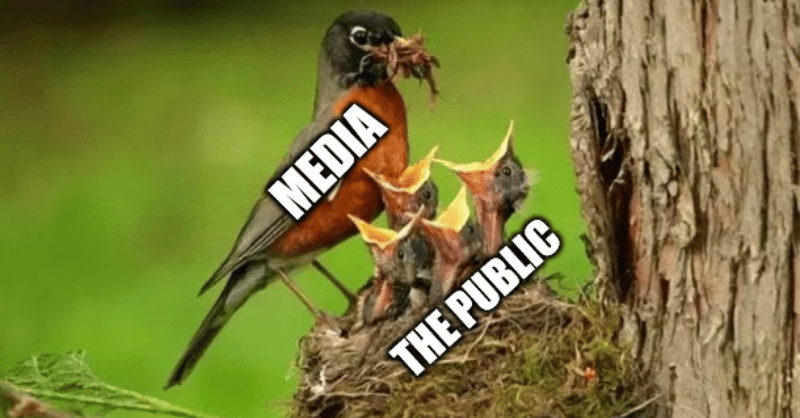- Fink 🧠
- Posts
- 💵 The Death Of Journalism
💵 The Death Of Journalism

In partnership with Utrust, the only crypto payments gateway your business needs 👇
Times of change, but the goal remains the same: fairness and freedom.
How different would the world be if everyone was aware of this? #utrustxMoney #xMoney #MultiversX #cryptopayments #crypto #Web3 pic.twitter.com/theAxx1PDl— Utrust (🔜 xMoney) (@UTRUST) April 14, 2023
Every day we're inundated with information from 'the media'. But how much is useful, reliable nuggets to help make sense of the world?
And how much is PR spin... Spoon-fed titbits for media sparrows to regurgitate into the mouths of their starving dependants?
I generally work on the assumption that EVERYONE is hungry for information.
One of the reasons conspiracy theories are so popular is because they help make sense of the world. They make us believe that there's some order within the chaos. A comforting and enticing lie wrapped up in a well-told story...
Over the course of time, storytelling has been one of the key ways that information is transmitted between humans.
Tribes would gather around camp fires while the elders would tell stories, passing lessons learned onto the next generations. There was value in those stories, the stuff that helped us survive...
"Remember John? No of course you don't. He heard a rustling in the bushes, thought it was just the wind then the tiger ate him. Now you know who John is ... or was. Don't be dead like John - if you hear rustling in the bushes, run"
Everything was smaller scale. Information was a valuable commodity and in short supply. There was so much that we, as individuals didn't know, and so much that our little tribes didn't know.
Now we have the opposite problem. Information is abundant. Modern society has terabytes of it. More is produced every day. And it can be found easily.
Petabytes, exabytes, zettabytes, one day even yottabytes of information can be accessed with the aid of a single prompt like...
What's bigger than a terabyte?
This abundance of information is a major contributor to the Death Of Journalism™
Or at least what we think (thought?) of as 'journalism'.
There are some who seek The Truth™ and really try to get the bottom of things. People like Liam Vaughan or Kit Chellel at Bloomberg for example, write far fewer articles, but focus on details and filling in the blanks that others miss.
Journalism is kind of like economic data. The faster it is, the less reliable.
That's why we have revisions to non-farm payrolls and multiple publishings of GDP data, each iteration adding accuracy. Even PMI's have a flash & final version.
Back to the journos. Truthseeker types are rare. The economics just don't stack up.
In a world where eyeballs attract advertisers and clicks generate revenue, there just aren't enough truths to uncover and demystify.
With pages to fill (digital or otherwise), journalism has become a contest of speed rather than accuracy. Which means it can be gamed...
“Show me the incentive and I’ll show you the outcome”
~ Charlie Munger
The incentives are to be a) first b) loudest
That's what gets rewarded (by the public via clicks, by the advertisers who pay for clicks, and by employers who use those clicks to measure 'success'). So that's the outcome. Fastest with the most clickbaity title wins. No points for style or depth. Plenty of room for error...
oh James....https://t.co/vRanTYWyAe— PiQ (@PriapusIQ) May 4, 2023
This need for speed can be taken advantage of by vested interests looking to dictate the narrative. FTX was the perfect example. The legend of SBF was born, even though the pieces really didn't fit together.
Public Relations firm M Group were responsible for the FTX public image until their bankruptcy. That SBF image was deliberately cultivated and managed for maximum effect. Not suggesting that M Group understood the nature of the biz, more that money incentivises effort...
And if you're a journo under pressure, wouldn't you be grateful if someone did half the work for you, and you could keep churning stories about the thing that everyone was interested in...?
On the Risk of Ruin podcast, Marc Cohodes shared how he had approached Bloomberg with researched, negative stories about SBF & FTX, only to be rebuffed and told that they would 'lose access' if they published any negative coverage.
On the moral side, it sounds reprehensible. This is how the world works. The scene from The Big Short when Brownfield go to the press with their scandal is in the film for good reason...
You think Timileaks would get an all access pass to Fed members to write his book, or the heads up for an exclusive article during a media blackout period if he was out here banging on about Fed policy errors every week?
On the non-moral side is the idea that if society keeps putting people in the spotlight, the lies fall away, the truth will out...
Like when SBF described his magic money boxes on Bloomberg's Odd Lots, leading Matt Levine to summarise 👇
"you’re just like 'I’m in the Ponzi scheme business and it’s pretty good'"
Even then, the illusion wasn't entirely shattered, and his whataboutery got some cheers too 👇
While everyone was talking about his description of yield farming, I thought SBF's description on the podcast of how VCs operate was absolutely devastating.
I posted the relevant part in today's @Markets newsletter: https://t.co/Pl5nZqsNJq pic.twitter.com/tnm2ZPMyq1— Joe Weisenthal (@TheStalwart) April 26, 2022
Everything was correct. Yes, I'm running ponzis and yes VC's are doing terrible sh*tty things too.
But once the quiet part is said out loud, you can't put those words back in the (magic) box...
In related news 👇
💰 COINBASE $COIN CEO ARMSTRONG: MORE CAPITAL IS REQUIRED IN THE CRYPTO ECONOMY. https://t.co/sJG6aVTdkw— PiQ (@PriapusIQ) May 8, 2023
COINBASE CEO SAYS CRYPTO IS RUNNING OUT OF MONEY
Not exactly a bullish headline, especially when Coinbase hasn't been able to turn a profit despite cutting costs and the recent crypto bounce/recovery...

trading volumes more than halved to $145 million while retail trading volumes, which had been instrumental in making Coinbase a household name in 2021, sank 72%.
Ironic that they're making a significant portion of their income by simply holding US treasury bills.
Anyhow, crying about needing more capital for the crypto economy while Coinbase keeps losing money (and the CEO & CFO can't dump shares quickly enough) doesn't inspire confidence... 👇

MarketBeat
⚠️ This is a public service announcement pic.twitter.com/LaXdYwZZ0J— Tim (@VolaTim) May 9, 2023
We wrote this last year. It still applies 👇

Does that mean that Coinbase is done for? Maybe. Or maybe these meetings went spectacularly well and the money will pour in...

Coinbase eyes expansion, explores UAE as potential crypto hub
It's OK not to know what's going to happen next. But would I want to own Coinbase stock? Absolutely not.
One of the most permanent, frustrating features of markets is that we're always working with incomplete information. Nobody knows everything.
(if everybody already knew everything, markets would become very boring)
So how do we deal with this incompleteness of information?
We go straight to my favourite artmeme (Yes it's definitely a thing)

This is where 'citizens journalism' comes in. It's why we need the short sellers and the cynics like Cohodes & Chanos to counter the relentless optimism of those who promote The Next Big Thing™.
Not because one side is right or wrong, just to balance out the arguments.
Ultimately, the responsibility to understand is ours, and ours alone. We can't rely on the government or the media to keep us fully informed.
🎵 Cheesy Hollywood music plays softly 🎵
But we can rely on each other.
Sickly and terribly un-British I know, but there are genuinely amazing people sharing knowledge, often for free. People who've spent decades working in their fields, testing and figuring stuff out.
I don't mean the VC deep thinker types or the twitter threadoooors that copy paste stuff from Wikipedia or Econ 101 textbooks.
I mean the ones who take risks, get their hands dirty, figure out how stuff really works, show the constraints & limitations of a theory when it's applied in practice, all of that stuff.
And they're out there. They're not usually journos, but they're on substacks, and Twitter and forums (remember those boomer?), even LinkedIn if you can stomach the cringe.
These are all excellent places to seek out dissenting voices calling out the bullsh*t, cross-check those explanations that seem a little too convenient, a little too neatly-wrapped. The world's a chaotic place, if there are no loose ends, that's always a bit suspicious...
To wrap this up, when you're reading the 'news', consider this excellent snippet from Ben Hunt 👇
The secret to reading critically? Ask yourself this:
Why am I reading this article NOW?
Just do that. You’re not saying that the article is a lie. You’re not saying that the article isn’t important.
You’re saying that there is a metagame at play here with the author and the sources of that article. You’re saying that you are aware of that metagame and you’re going to take that into account before deciding your behavior in reaction to that article.
Who are the Writers of the World-As-It-Is? They are Republicans. They are Democrats. They are central bankers. They are pundits. They are politicians. They are oligarchs. They are in every nation on Earth. They have ONE thing in common. They’re Writing for their own political and economic advantage. And they’re really, really good at shaping our behaviors with their words.
It’s never been more important to read critically and think critically. Not because you’re a nihilist or you believe in nothing. But because you believe in yourself. Because you’re smart enough and wise enough to make up your own damn mind.
